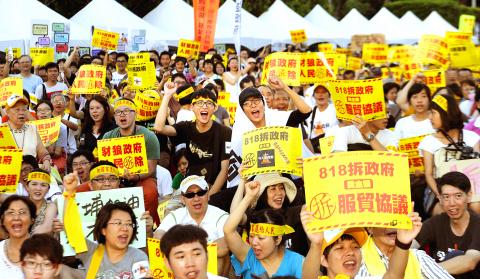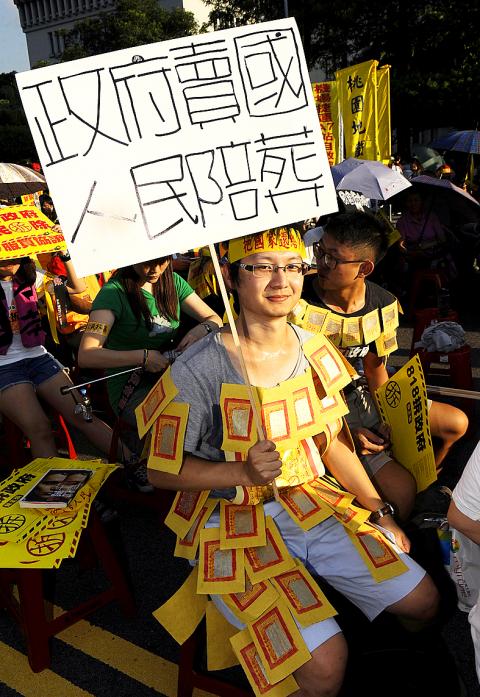Tens of thousands of people rallied yesterday in front of the Presidential Office in Taipei and marched to the Executive Yuan, calling on government officials to apologize for forced land seizures and to stop such policies.
“It is Aug. 18 today, and it was just three years ago, on Aug. 17, that the government promised Dapu [Borough 大埔] residents that their houses would be preserved, while their farmland would be relocated,” Taiwan Rural Front (TRF) president Hsu Shih-jung (徐世榮) said.
“After government officials failed to keep their promises and instead flattened private homes, they ask us to remain calm, but how can we stay calm?” Hsu asked.

Photo: Chen Chih-chu, Taipei Times
The crowd responded with cheering and applause.
“Apologize and compensate!” “Return the land to the people!” they shouted.
Hsu was referring to a negotiation meeting held in 2010 which featured Vice President Wu Den-yih (吳敦義), who was then premier; Premier Jiang Yi-huah (江宜樺), the then minister of the interior; and Miaoli County Commissioner Liu Cheng-hung (劉政鴻), following a series of protests against a plan to clear private land and homes to make way for a science park.

Photo: Chen Chih-chu, Taipei Times
However, despite government promises, four houses in Miaoli County’s Dapu were torn down unexpectedly on July 18, when the county commissioner sent in demolition squads escorted by police officers while the home owners and their supporters were in Taipei protesting the demolition plan.
Asked about the surprise demolition the day after, Liu called it a “god-given opportunity.”
“A month ago, we said that we will tear down the government if they don’t apologize, and now here we are,” said Liao Pen-chuan (廖本全), an associate professor at National Taipei University’s Department of Real Estate and Built Environment.
“We’re not flattening government buildings, but what we are going to do is to destroy the system, which is supposed to protect the disadvantaged. We’re also taking down politicians who are misusing the system to exploit the disadvantaged,” Liao added.
The crowd also set up a mock memorial hall for the county commissioner, with Liu’s portrait in the center, and flowers and incense burners in front of the portrait.
A bag of cow manure was also placed by the mock memorial for people to throw at Liu’s portrait.
“Liu Cheng-hung, cross over the bridge!” the crowd shouted, referring to a traditional belief that the spirit of a newly dead person crosses a bridge into the underworld for judgment.
Since it is believed that the spirits are confused and do not know the way, he or she needs to be reminded to cross the bridge.
Several other organizations for people affected by different development projects also showed up at the rally to show their support and to tell the crowd their stories.
The four families from the demolished houses in Dapu thanked the crowd for their support and promised they will stand with other victims of development projects from now on.
After the rally, the crowd made a stop at the Ministry of the Interior, which is in charge of approving development or urban projects, where they protested outside the building.
The protest was still ongoing as of press time.

CHAOS: Iranians took to the streets playing celebratory music after reports of Khamenei’s death on Saturday, while mourners also gathered in Tehran yesterday Iranian Supreme Leader Ayatollah Ali Khamenei was killed in a major attack on Iran launched by Israel and the US, throwing the future of the Islamic republic into doubt and raising the risk of regional instability. Iranian state television and the state-run IRNA news agency announced the 86-year-old’s death early yesterday. US President Donald Trump said it gave Iranians their “greatest chance” to “take back” their country. The announcements came after a joint US and Israeli aerial bombardment that targeted Iranian military and governmental sites. Trump said the “heavy and pinpoint bombing” would continue through the week or as long

TRUST: The KMT said it respected the US’ timing and considerations, and hoped it would continue to honor its commitments to helping Taiwan bolster its defenses and deterrence US President Donald Trump is delaying a multibillion-dollar arms sale to Taiwan to ensure his visit to Beijing is successful, a New York Times report said. The weapons sales package has stalled in the US Department of State, the report said, citing US officials it did not identify. The White House has told agencies not to push forward ahead of Trump’s meeting with Chinese President Xi Jinping (習近平), it said. The two last month held a phone call to discuss trade and geopolitical flashpoints ahead of the summit. Xi raised the Taiwan issue and urged the US to handle arms sales to

State-run CPC Corp, Taiwan (CPC, 台灣中油) yesterday said that it had confirmed on Saturday night with its liquefied natural gas (LNG) and crude oil suppliers that shipments are proceeding as scheduled and that domestic supplies remain unaffected. The CPC yesterday announced the gasoline and diesel prices will rise by NT$0.2 and NT$0.4 per liter, respectively, starting Monday, citing Middle East tensions and blizzards in the eastern United States. CPC also iterated it has been reducing the proportion of crude oil imports from the Middle East and diversifying its supply sources in the past few years in response to geopolitical risks, expanding

OTHER OPTIONS: Given possible US intervention and Taiwanese counterattacks, China might opt to blockade Taiwan or take its outlying islands instead of an all-out invasion A US think tank has urged Taiwan to adopt a “hellscape” strategy that would flood the Taiwan Strait with drones and other uncrewed systems to deter invasion by China. In its report, Hellscape for Taiwan, published on Thursday, the Center for a New American Security said Taipei’s asymmetric defense approach — often described as a “porcupine strategy” — needs to evolve to keep pace with the growing capabilities of the Chinese People’s Liberation Army. The “hellscape” strategy involves saturating the air and waters around Taiwan with thousands of drones and other platforms capable of striking invading forces from multiple domains at once. Long-range